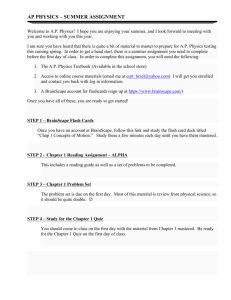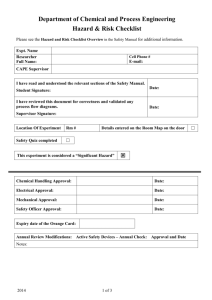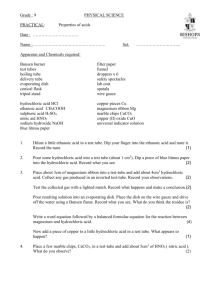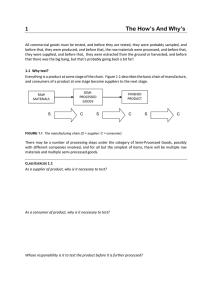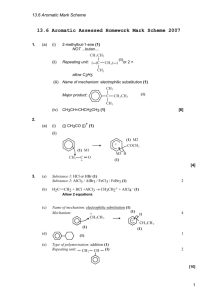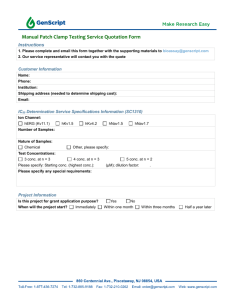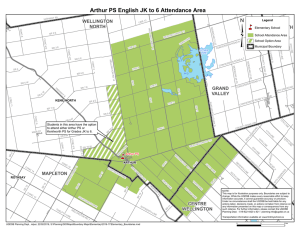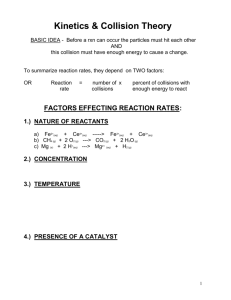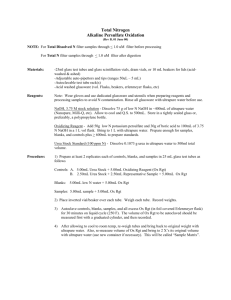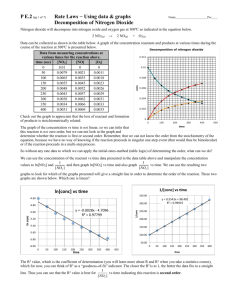Preparation of samples for metals analysis on the Inductively
advertisement
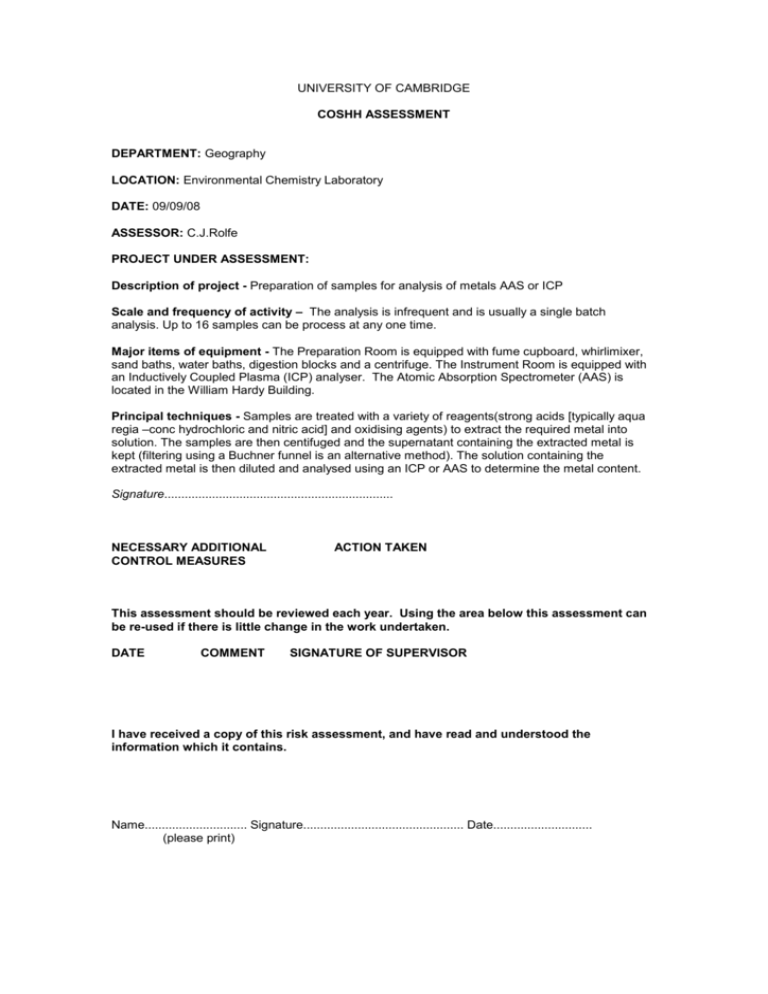
UNIVERSITY OF CAMBRIDGE COSHH ASSESSMENT DEPARTMENT: Geography LOCATION: Environmental Chemistry Laboratory DATE: 09/09/08 ASSESSOR: C.J.Rolfe PROJECT UNDER ASSESSMENT: Description of project - Preparation of samples for analysis of metals AAS or ICP Scale and frequency of activity – The analysis is infrequent and is usually a single batch analysis. Up to 16 samples can be process at any one time. Major items of equipment - The Preparation Room is equipped with fume cupboard, whirlimixer, sand baths, water baths, digestion blocks and a centrifuge. The Instrument Room is equipped with an Inductively Coupled Plasma (ICP) analyser. The Atomic Absorption Spectrometer (AAS) is located in the William Hardy Building. Principal techniques - Samples are treated with a variety of reagents(strong acids [typically aqua regia –conc hydrochloric and nitric acid] and oxidising agents) to extract the required metal into solution. The samples are then centifuged and the supernatant containing the extracted metal is kept (filtering using a Buchner funnel is an alternative method). The solution containing the extracted metal is then diluted and analysed using an ICP or AAS to determine the metal content. Signature................................................................... NECESSARY ADDITIONAL CONTROL MEASURES ACTION TAKEN This assessment should be reviewed each year. Using the area below this assessment can be re-used if there is little change in the work undertaken. DATE COMMENT SIGNATURE OF SUPERVISOR I have received a copy of this risk assessment, and have read and understood the information which it contains. Name.............................. Signature............................................... Date............................. (please print) COSHH Assessment - Preparation Room, Department of Geography. PROJECT: Preparation of samples for analysis of metals. HAZARD Hazardous substances (including waste products) acetone (propanone) methylated spirit hydrogen peroxide 35% 100v nitric acid conc. 1.42 spg nitric acid 20% soln. hydrochloric acid conc. 35% hydrochloric acid 7% soln. sulphuric acid conc. 98% Quantities Stored l/Kg 2.5l 5l 10l 2.5l 5l 2.5l 5l 2.5l In-use g/ml 30ml 300ml 1.2l 300ml 600ml 800ml 600ml 20ml Frequency daily daily daily occasionally monthly weekly daily daily CONTROL MEASURES Potential Duration hours/day <1 (15min) 1-4 1-4 <1 (5min) <1 (15min) <1 (5min) 1-2 <1 (5min) Exposure limit absorption route Ih,Ig,SC,E Ih,Ig,SC,E Ih,Ig,SC,E Ih,Ig,SC,E Ig,SC,E 5 Ih,Ig,SC,E Ig,SC,E 7 Ih,Ig,SC,E Personal Emergency short / long-term mg m-3 mg m-3 2400 3000 1900 1.5 5 10 10 7 7 7 1 - Additional comments: All students and workers are advised of potential hazards associated with these chemicals. The use of commonsense controls and safety procedures are promoted at all times. NOTES: Potential absorption route - Ih=lnhalation, Ig=Ingestion, SC=Skin Contact, E=Eyes. Personal protection - g=gloves, a=apron, s=safety glasses. Emergency procedures - h=hospital, s=sodium carbonate solution, l=slaked lime, e=eye washing. protection procedures g,s g,s g,a,s g,a,s g,s g,a,s g,s g,a,s e e h,e h,s,l,e e h,s,l,e e h,s,l,e COSHH Risk Assessment - Preparation Room, Department of Geography. PROJECT: Preparation of soil, samples for analysis of metals. Severity of risk Likelihood of risk assessment Hazardous substances (including waste products) Total risk acetone (propanone) 3 methylated spirit 3 2 hydrogen peroxide 35% 100v nitric acid conc. 1.42 spg 4 nitric acid 20% soln. 2 hydrochloric acid conc. 35% hydrochloric acid 7% soln. 2 sulphuric acid conc. 98% 4 6 2 6 4 2 2 4 3 2 2 8 4 2 6 8 8 8 Severity 5 V.High - Possibility of multiple deaths/structural damage 4 High - Death or serious injury to an individual 3 Moderate - Injury/disease to individual - 3 day absence 2 Slight - minor injury - first aid - continue work 1 Nil - no risk of injury or disease Likelihood 5 V.Likely - Almost 100% certain if work continues 4 Likely 3 Quite possible 2 Possible 1 Not likely - Would only occur under freak conditions
